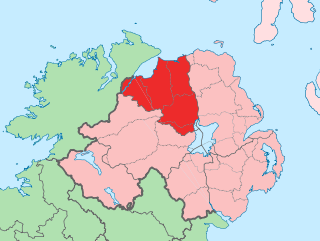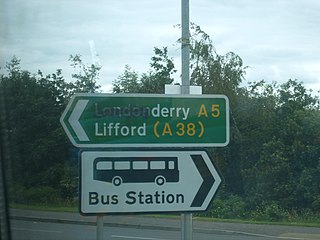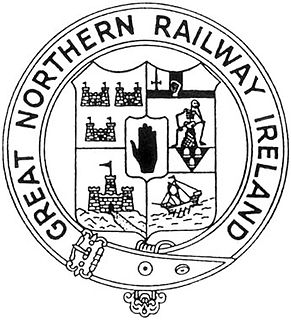| |||||
| Centuries: | |||||
|---|---|---|---|---|---|
| Decades: | |||||
| See also: | Other events of 1619 List of years in Ireland | ||||
Events from the year 1619 in Ireland.
| |||||
| Centuries: | |||||
|---|---|---|---|---|---|
| Decades: | |||||
| See also: | Other events of 1619 List of years in Ireland | ||||
Events from the year 1619 in Ireland.

Derry, officially Londonderry, is the second-largest city in Northern Ireland and the fifth-largest city on the island of Ireland. The name Derry is an anglicisation of the Old Irish name Daire meaning 'oak grove'. The old walled city lies on the west bank of the River Foyle, which is spanned by two road bridges and one footbridge. The city now covers both banks.

County Donegal is a county of Ireland in the province of Ulster and in the Northern and Western Region. It is named after the town of Donegal in the south of the county. It has also been known as County Tyrconnell, after the historic territory of the same name, on which it was based. Donegal County Council is the local council and Lifford the county town.

County Londonderry, also known as County Derry, is one of the six counties of Northern Ireland, one of the thirty two counties of Ireland and one of the nine counties of Ulster. Before the partition of Ireland, it was one of the counties of the Kingdom of Ireland from 1613 onward and then of the United Kingdom after the Acts of Union 1800. Adjoining the north-west shore of Lough Neagh, the county covers an area of 2,118 km2 (818 sq mi) and today has a population of about 247,132.

John Hume was an Irish nationalist politician from Northern Ireland, widely regarded as one of the most important figures in the recent political history of Ireland, as one of the architects of the Northern Ireland peace process.
Events in the year 1972 in Ireland.
Events in the year 1969 in Ireland.
Events from the year 1920 in Ireland.

The names of the city and county of Derry or Londonderry in Northern Ireland are the subject of a naming dispute between Irish nationalists and unionists. Generally, although not always, nationalists favour using the name Derry, and unionists Londonderry. Legally, the city and county are called "Londonderry", while the local government district containing the city is called "Derry City and Strabane". The naming debate became particularly politicised at the outset of the Troubles, with the mention of either name acting as a shibboleth used to associate the speaker with one of Northern Ireland's two main communities. The district of Derry and Strabane was created in 2015, subsuming a district created in 1973 with the name "Londonderry", which changed to "Derry" in 1984.

Cecil Frances Alexander was an Anglo-Irish hymnwriter and poet. Amongst other works, she wrote "All Things Bright and Beautiful", "There Is a Green Hill Far Away" and the Christmas carol "Once in Royal David's City".
The Northern Ireland Civil Rights Association (NICRA) was an organisation that campaigned for civil rights in Northern Ireland during the late 1960s and early 1970s. Formed in Belfast on 9 April 1967, the civil rights campaign attempted to achieve reform by publicising, documenting, and lobbying for an end to discrimination in areas such as elections, discrimination in employment, in public housing and abuses of the Special Powers Act. The genesis of the organisation lay in a meeting in Maghera in August 1966 between the Wolfe Tone Societies which was attended by Cathal Goulding, then chief of staff of the Irish Republican Army (IRA).

The Derry County Board of the Gaelic Athletic Association (GAA) or Derry GAA is one of the 32 county boards of the GAA in Ireland. It is responsible for Gaelic games in County Londonderry in Northern Ireland. The county board is also responsible for the Derry county teams.

The Great Northern Railway (Ireland) was an Irish gauge railway company in Ireland. It was formed in 1876 by a merger of the Irish North Western Railway (INW), Northern Railway of Ireland, and Ulster Railway. The governments of Ireland and Northern Ireland jointly nationalised the company in 1953, and the company was liquidated in 1958: assets were split on national lines between the Ulster Transport Authority and Córas Iompair Éireann.
Murals in Northern Ireland have become symbols of Northern Ireland, depicting the region's past and present political and religious divisions.

CLG Eoghan Rua Cúil Raithin is a Gaelic Athletic Association club based in Coleraine, County Londonderry, Northern Ireland. Despite some of the club's catchment area being in County Antrim, the club is a member of the Derry GAA. Eoghan Rua currently cater for Gaelic Football, Hurling, Camogie, and Ladies' Gaelic football and also compete in Scór and Scór n nÓg. The club's name commemorates Eoghan Rua Ó Néill.
Events from the year 1689 in Ireland.
Events from the year 1718 in Ireland.
Events from the year 1613 in Ireland.
The 2012–13 All-Ireland Senior Club Hurling Championship was the 43rd staging of the All-Ireland championship since its establishment by the Gaelic Athletic Association in 1970. The draw for the 2012-13 fixtures took place in August 2012. The championship began on 14 October 2012 and ended on 17 March 2013. Loughgiel Shamrocks were the defending champions.
The 1959–60 National Football League was the 29th staging of the National Football League (NFL), an annual Gaelic football tournament for the Gaelic Athletic Association county teams of Ireland.
James MacKnight (1801-1876) was an Irish journalist and agrarian reformer whose call for Fair Rent, Fixity of Tenure and Free Sale briefly surmounted Ireland's political and sectarian division. In the United Kingdom general election of 1852 the all-Ireland Tenant Right League, which MacKnight formed in a joint initiative with Charles Gavan Duffy, helped return 48 pledged MPs. Pulled between Catholic and nationalist sentiment in the south and the strength of Protestant and unionist feeling in the north, the League and its Independent Irish Party did not survive the elections of 1857. In Ulster, MacKnight supported tenant-right candidates committed to the legislative union with Great Britain, while remaining sharply critical of British government efforts to address Ireland's continuing agrarian crisis.